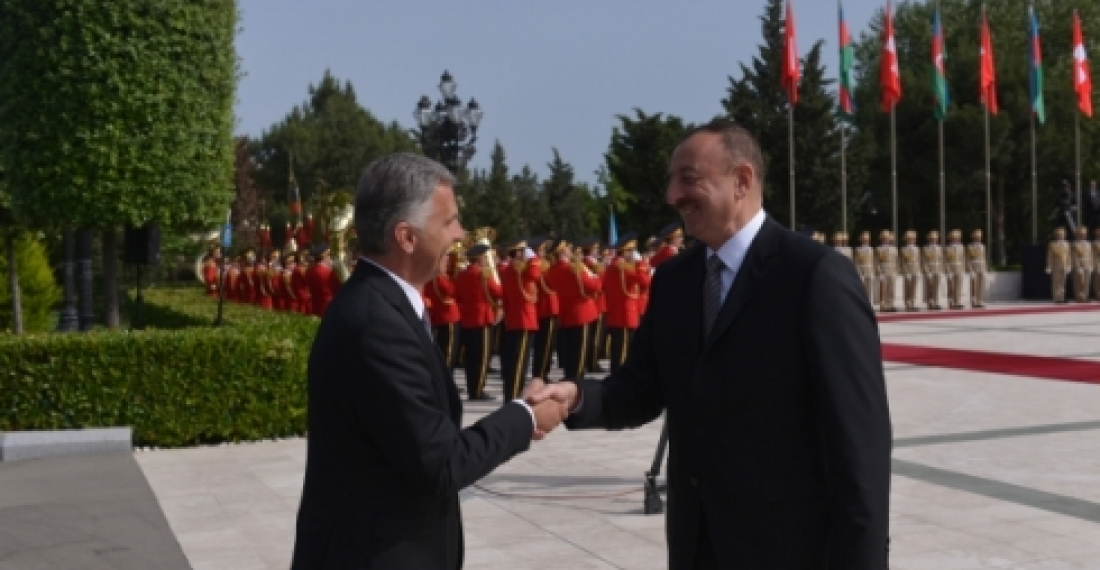At the start of a visit to the South Caucasus the President of the Swiss Confederation and current head of the OSCE proposes the "start of structured negotiations leading to a peace agreement".
The President of the Swiss Confederation, and current Chairman-in-Office of the Organisation for Security and Co-operation in Europe, on Monday conducted an intensive day of meetings in Baku, during which he met with the Azerbaijani President, Ilham Aliev, government officials, representatives of opposition parties and organisations and NGOs, as well as representatives of those displaced by conflict.
A statement by the Swiss Foreign Ministry said that President Burkhalter called for a commitment on all sides to find a solution, saying in his capacity as OSCE Chairperson-in Office "We must progress step by step towards peace. Specifically, he advocated a new meeting between the presidents of Azerbaijan and Armenia that would mark the starting point of a structured negotiating process on a peace agreement. In addition, he appealed for the consistent implementation of the measures to ensure compliance with the 1994 ceasefire. In spite of the ceasefire, numerous violent incidents continue to flare up on the ceasefire line and at the border still today. "Violent incidents 20 years after the ceasefire are unacceptable to the Swiss OSCE Chairmanship," President Burkhalter categorically stated. He stressed that the Swiss OSCE Chairmanship was ready and willing to support both sides in their commitment, if desired.
Furthermore, he spoke out in favour of intensified direct contacts between representatives of civil society in both countries as a way to reduce prejudices and promote mutual trust. He also expressed his concern about repressive actions against individuals working for a rapprochement between the two countries.
Commonspace.eu political editor commented on the new Swiss initiative:
"This is an important development aimed at breaking the current impasse in the negotiations over the settlement of the Nagorno-Karabakh conflict. The call for a structured negotiating process leading to a peace agreement indicates that the international community wishes to move on from the current ad hoc format, where the sides engage with the negotiations at their pleasure and at their leisure, to a more time tabled process with a clear end game. No further details are available, and for the moment it seems that the co-Chair of the OSCE Minsk Process will remain the focal point of the international community's efforts to resolve the conflict. But this is a clear attempt to take the negotiations to a new, more intensive level. The reaction in Baku, where Burkhalter spent his first day of his South Caucasus visit has so far been positive. President Aliev welcomed Burkhalter's visit and Swiss efforts for resolving the conflict. President Burkhalter is expected in Armenia on Wednesday. The Swiss government made it clear in its statement that a meeting between the Armenian and Azerbaijani Presidents will need to kick-start the new initiative. The Swiss President referred to ongoing cease fire violations which it describes as "unacceptable" and expressed "concern" about the repression of those working to promote a rapproachment between Armenia and Azerbaijan.
It is clear that Switzerland is not simply going through the diplomatic motions expected from a current Chairman of the OSCE but is proposing a clear road-map to the sides for moving forward. This opportunity must not be missed. The governments of Armenia and Azerbaijan should quickly accept the new Swiss approach and engage with it constructively."
source: commonspace.eu
photo: President Aliev welcomes President Didier Burkhalter of the Swiss Confederation in Baku on Monday, 2 June 2014.







